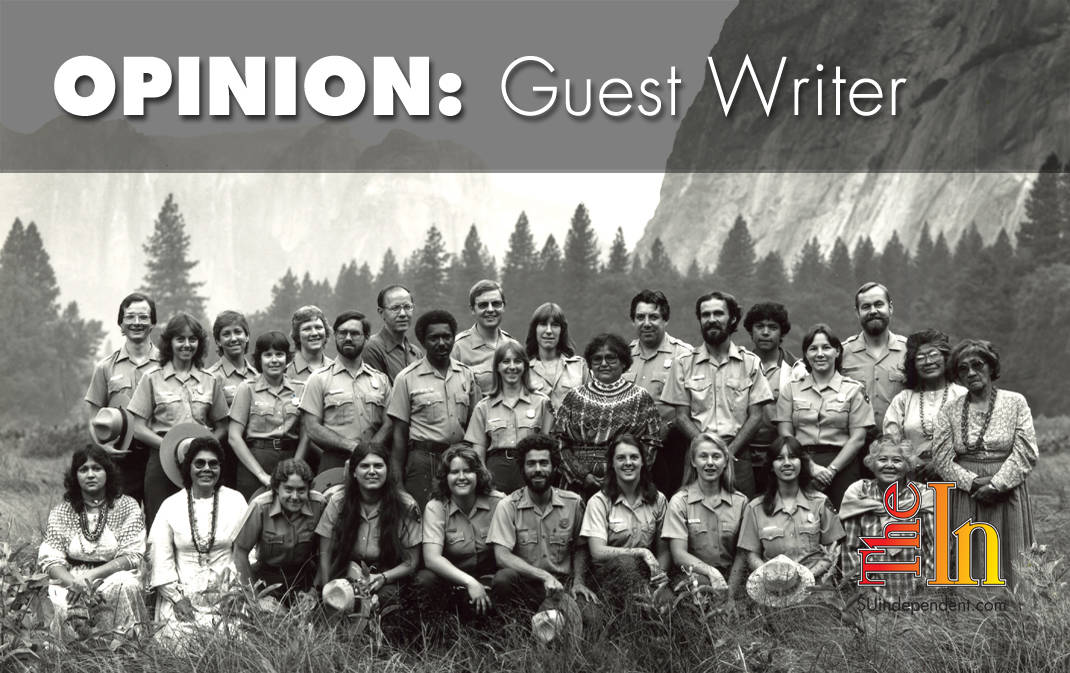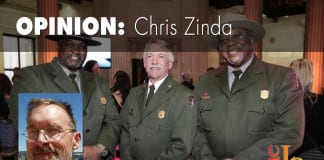 By Alfred Runte
By Alfred Runte
Face it. Our country is getting entirely too comfortable with witch hunts as we continue to splinter into bickering groups. Writing for The Independent, Chris Zinda now faults the National Park Service for being too white and male. How is that not a witch hunt?
Zinda certainly does not describe the Park Service I have known these past 50 years. When I graduated college in 1969, the agency wouldn’t hire me. I was rather told that every position that year had been reserved for women and minorities.
Were there jobs in maintenance, supply, and protection? Perhaps. But I wanted to be an interpreter.
In 1980, now with a Ph.D. and having written a book on the national parks, I was offered a seasonal interpretive position in Yosemite National Park. However, in my last group photograph from 1983 (shown above), you will see nothing but diversity.
Once a concept, diversity has itself morphed into a convenient excuse for conducting witch hunts. You had better flood your office with women and minorities, or I will accuse you of being a “good old boy.” The ulterior motive is abundantly clear. Society may now accuse you of anything it wants.
That is not due process. It remains a witch hunt. Now comes this business about Jonathan Jarvis writing a book. As head of the University of the Wilderness, he is supposed to be intellectually inclined. Ask permission to write a book? Why? The permission came with his job.
It remains politics, not intellect, further insisting that every workforce “reflect” the country. If so, why has no one told the NBA or NFL?
The historical truth, as well we know, is that society does not change overnight. But it is changing — and has changed. Consider again my picture from 1983. Practically everyone there, and especially the women and minorities, went on to a distinguished career with the National Park Service.
Like any label, diversity is meant as a shortcut. Those using the term hope our thinking will buckle. Suddenly, men holding office are just the good old boys. We are not supposed to ask whether they earned it but rather immediately conclude that they did not.
As alarming, most of our colleges and universities have perfected the practice. All male professors are innately privileged and, what is more, guilty of sexual harassment. All men look at women “funny.” Consequently, bureaucrats hired to watch every move of the faculty now outnumber the faculty itself.
As a historian of the national parks, I withhold my judgment of Jonathan Jarvis. The point is that his record should be judged by history. His race, class, or gender prove not a thing. But yes, now that we Americans are out looking for witches, we begin by demanding that the witch apologize for every accident of her birth.
Few things in life are ever fair. A century ago, my father was in the trenches on the Western Front, fighting for his native Germany. Badly wounded, he survived and emigrated to the United States where he still died young. My uncle August was not even that lucky, dying in a bunker just weeks before World War I came to its final, bloody end.
We all have horror stories in our family histories. All of us have had obstacles and injustices to overcome. In the past, America was about solving problems, not creating more of them by suggesting that men alone have had it easy.
Again, Zinda does not describe the Park Service I know; but yes, he well describes the new America in which careers are being destroyed by feeble ideas. The point is this: Who is watching the ideologues in every government bureaucracy when they go looking for a length of rope?
So Jarvis worked his way up as a seasonal ranger, making “connections” along the way. Well, that is how it works in the professional world. You begin as an apprentice and pay your dues.
Women and minorities in the Park Service — at least the successful ones — have as eagerly embraced the process, too. They network to a fault. Did they earn their careers? You bet they did. And so did Jarvis.
An environmental historian, Alfred Runte is the author of “National Parks: The American Experience” (Taylor Trade Publishing) and other books on the public lands and railroads. He lives in Seattle.





Thank you for your rebuttal, Mr. Runte.
I struggled with the piece, as I wrote well over 5,000 words. The struggle is indicative of the quality of my piece.
Statistics. The NPS has made NO improvements in minority hiring during Jarvis’ tenure and employee satisfaction within the agency has declined 10%. ONPS and perm/FTE have fallen, slack taken with higher recreation fees and a greater reliance on private sector employees. He has done nothing regarding the Tragedy of the Commons (carrying capacity) and even you give him a pass on his legal requirements regarding his book deal. Nice.
More insidious, he had a duty of which he and I spoke of in the past, and squandered it. An excerpt from what I cut:
“Giving him credit where credit is due, Jarvis has done a good job replacing the old paradigm of knucklehead Law Enforcement Chief Rangers to park Superintendencies with Chief of Resource Management professionals to Superintendencies – Zion NP being one. However, the NPS under his tenure has continued to fail miserably to ensure that people of color and gender represent his agency at all occupations and throughout the economic spectrum. As a result, the NPS continues to be an immoral and unethical “good ole white boy” network that is very much against a professional meritocracy, the foundation of which our civil service is to be built.
In the OIG ethics report Jarvis is quoted as saying, “I think I knew going into this there was a certain amount of risk. I’ve never been afraid of a risk. . . . I’ve gotten my ass in trouble many, many, many times in the Park Service by . . . not necessarily getting permission . . . I’ve always pushed the envelope.” I don’t think he is being self aware, as he is consistently conservative, his advice when exasperated with me pushing him to make decisions that there was seldom, if ever, a time to fall on your sword. That when your career is a work in progress, one must carefully put oneself in positions of authority to do the most good in the long run.
While Rachel Maddow was swooning over Jon’s mustache during the Federal government shutdown in 2013, she was missing the Obama Administration’s continual naive thinking that through negotiation and a willingness to give one can reach agreement with a Republican Congress. Jon could have remained firm against the Administration for the benefit of the Service and its missions. Instead, he was a good footsoldier and appears to have willingly given up the critical Washington Monument strategy of budgeting by allowing states, like Utah, to open national park sites during federal government shutdowns. Utah is currently asking for reimbursement.
As a public official or civil servant, I believe there are oftentimes “untenable opportunities” to do the right thing that may result in a negative impact on their career. Falling on your sword, some say. For bureaucrats like Jarvis, this is usually at the end of their career when they have reached the apex and for something substantial.
It is too bad that for Jarvis his sword falling and breach of ethics was over a minor book deal rather than something morally imperative important like breaking up the “good ole white boy’s” network as an appointee of a minority President by making real improvements in workforce composition or fighting against that President to maintain a powerful budgeting strategy that has protected the Washington Monument and NPS for decades.”
To add, neither you nor Supt. Harriet in her response to my piece address the economic questions associated with the time and money it takes to “pay your dues” that also results in a white workforce. You must have wealth to engage in the system, as people with Graduate degrees and bills to pay. Most people cannot afford years of internships, volunteering, and then no benefit, seasonal positions at GS-3/5/7 to finally ascend.
I am interested in not only writing about the Centennial but with Vail in mindl. Always talking about addressing its organizational issues, from my perspective it seems the NPS seldom makes any progress – in part because of the “good ole boy” network of the NPS.
Again, thanks for your rebuttal. Love the discussion.